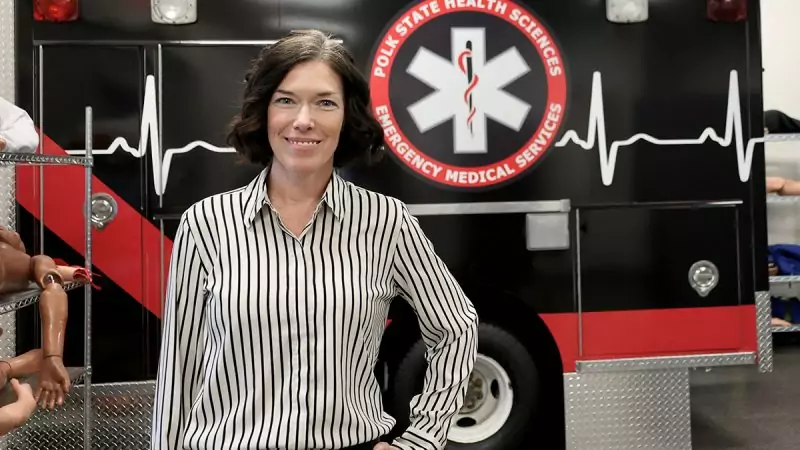Polk State EMS alum returns to program as clinical coordinator

Lisa Correll’s passion for education and pride in Polk State College’s Emergency Medical Services Program is evident upon meeting her. With a 10-year career in emergency medicine and as an alum of Polk State EMS, she has returned to the College as a clinical coordinator and is dedicated to growing the talent pipeline of highly skilled emergency medical technicians and paramedics.
“There is nowhere else you can go and receive the experience we offer here at Polk State College. It’s a rigorous program, but it works,” Correll said. “As a student, I chose to commute to Polk State past other schools because of its strong reputation for strong students. Now as a clinical coordinator, I want to serve as an example for our students because I have been through the program, and they can do it too.”
Her interest in health sciences was sparked in high school when she served as a clerk in an emergency room, but upon graduation, she wasn’t quite sure what area of the diverse field of healthcare she wanted to go into.
Correll, the first generation in her family to graduate from college, achieved her bachelor’s degree in Behavioral and Social Sciences with concentrations in Humanities, Criminal Justice, and Sociology, illustrating her love for learning.
“It’s all so interesting but my love for the sciences prevailed,” she explained about going back to work in the emergency room and enrolling in the Polk State EMS Program.
“There is nowhere else you can go and receive the experience we offer here at Polk State College. It’s a rigorous program, but it works.”
She completed her EMT training and transitioned into the paramedic program, which has a prevailing reputation for its rigor and success in producing highly skilled professionals.
“I was a newly single mom, and it was a huge time commitment with classes, clinicals, and ride time,” Correll said. “But it was about setting an example for my kids; showing them that they can find their paths and accomplish whatever they put their minds to.”
“It was a hard year, but their memories are very different from my own,” she added. “I remember being too exhausted to cook; they remember a picnic with pizza in front of the TV. I’m grateful for that.”
She persevered, noting the support of her parents along the way, and became a paramedic in August 2013. She also achieved her Polk State Associate in Science in Emergency Medical Services.
With her credentials, she transitioned from working with Highlands County EMS to Polk County Fire Rescue as a paramedic.
“Up until that point, it was the proudest moment in my life,” Correll said.
She continued to set new goals and achieve them. She was promoted to Captain, specifically as a field training officer, and enrolled in a dual master’s degree program at UCF.
“As a student, I chose to commute to Polk State past other schools because of its strong reputation for strong students. Now as a clinical coordinator, I want to serve as an example for our students because I have been through the program, and they can do it too.”
In 2019, a new challenge presented itself when she suffered from an on-the-job injury.
“It was devastating. It impacted everything that I identified about myself, including being a good medic and what I contribute to the world,” Correll reflected.
But she didn’t let it slow her down. She became an adjunct instructor for Polk State’s EMS Program in 2020, and when she completed her dual master’s degree in Public Administration and Nonprofit Management, the clinical coordinator position became available.
She credits Polk State EMS Program Director Frank Dunn for motivating her along the way, first during her EMT clinicals to continue on to paramedic training, then as a colleague in the field training for PCFR when she was recruited as an adjunct instructor for the College.
Correll is the first woman to hold a full-time position within the program and in her current role, she coordinates clinical experiences in the field for students and ensures that they are meeting state and national regulations. This includes clinicals in hospitals and ride time on emergency medical vehicles.
She continues to teach courses for the Emergency Medical Responder, Emergency Medical Technician, and Paramedic tracks and is pursuing a doctorate in Organization Leadership.
“Part of my doctoral work is looking at testing data, including when students test better and how their testing is affected by course delivery,” she explained. “Our students are tested on knowledge every day with a daily quiz to solidify what they know and evaluate where they need to improve.”
Polk State’s EMT and paramedic graduates boast 100 percent pass rates on the National Registry of Emergency Medical Technicians certification exams, compared to national average pass rates of 69 percent and 71 percent, respectively, in 2021.
“The structure of our program helps. We don’t compromise the standard,” Correll said. “We have para-subject matter experts who are passionate about what they do. We have partners like Lakeland Regional Health who provide quality clinical experiences. We provide quality scenario training and simulated stress tests.”
“The benefits of the knowledge and experience students gain here at Polk State College outweigh the extra challenge.”
“We are teaching them to be great medical providers right out the door, ready to function,” she added. “The benefits of the knowledge and experience students gain here at Polk State College outweigh the extra challenge.”
More information about the Polk State Emergency Medical Services Program is available at www.polk.edu/EMS.

